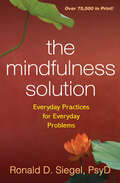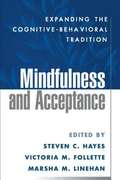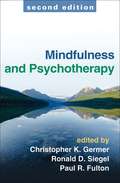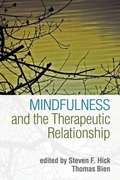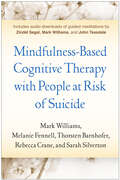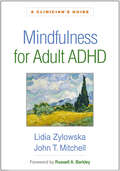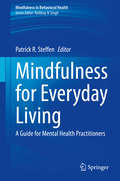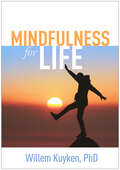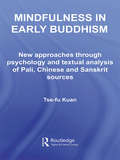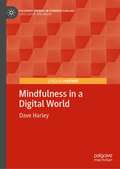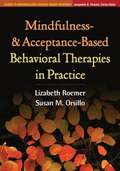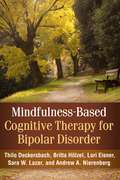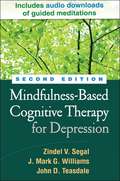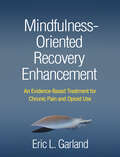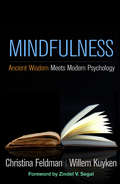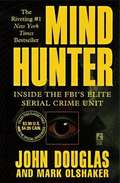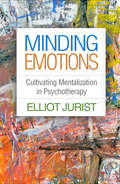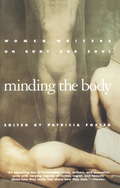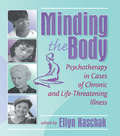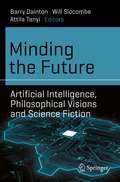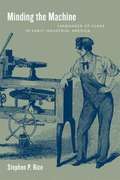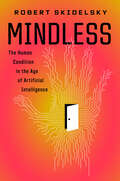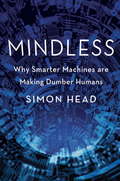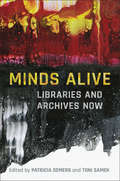- Table View
- List View
Mindfulness Solution
by Ronald SiegelMindfulness offers a path to well-being and tools for coping with life's inevitable hurdles. And though mindfulness may sound exotic, you can cultivate it--and reap its proven benefits--without special training or lots of spare time. Trusted therapist and mindfulness expert Dr. Ronald Siegel shows exactly how in this inviting guide. You'll get effective strategies to use while driving to work, walking the dog, or washing the dishes, plus tips on creating a formal practice routine in as little as 20 minutes a day. Flexible, step-by-step action plans will help you become more focused and efficient in daily life; cope with difficult feelings, such as anger and sadness; deepen your connection to your spouse or partner; feel more rested and less stressed; curb unhealthy habits; find relief from anxiety and depression; and resolve stress-related pain, insomnia, and other physical problems. Free audio downloads of the meditation exercises are available at the author's website www.mindfulness-solution.com. Start living a more balanced life--today.
Mindfulness and Acceptance
by Victoria Follette Steven HayesThis volume examines the role of mindfulness principles and practices in a range of well-established cognitive and behavioral treatment approaches. Leading scientist-practitioners describe how their respective modalities incorporate such nontraditional themes as mindfulness, acceptance, values, spirituality, being in relationship, focusing on the present moment, and emotional deepening. Coverage includes acceptance and commitment therapy, dialectical behavior therapy, mindfulness-based cognitive therapy, integrative behavioral couple therapy, behavioral activation, and functional analytic psychotherapy. Contributors describe their clinical methods and goals, articulate their theoretical models, and examine similarities to and differences from other approaches.
Mindfulness and Psychotherapy, Second Edition
by Ronald D. Siegel Paul R. Fulton Christopher K. GermerThis practical book has given tens of thousands of clinicians and students a comprehensive introduction to mindfulness and its clinical applications. Leading practitioners in the field present clear-cut procedures for implementing mindfulness techniques and teaching them to patients experiencing depression, anxiety, chronic pain, and other problems. Also addressed are ways that mindfulness practices can increase acceptance and empathy in the therapeutic relationship. The book describes the philosophical underpinnings of mindfulness and reviews the growing body of treatment studies and neuroscientific research. User-friendly features include illustrative case examples and practice exercises. New to This Edition *Incorporates significant empirical advances--mindfulness has become one of the most-researched areas in psychotherapy. *Most chapters extensively revised or rewritten. *Chapters on practical ethics, trauma, and addictions. *Greater emphasis on the role of acceptance and compassion in mindfulness.
Mindfulness and the Therapeutic Relationship
by Thomas Bien Steven HickA number of books have explored the ways psychotherapy clients can benefit from learning and practicing mindfulness. This is the first volume to focus specifically on how mindfulness can deepen the therapeutic relationship. Grounded in research, chapters demonstrate how therapists' own mindfulness practice can help them to listen more attentively and be more fully present. Leading proponents of different treatment approaches-including behavioral, psychodynamic, and family systems perspectives-illustrate a variety of ways that mindfulness principles can complement standard techniques and improve outcomes by strengthening the connection between therapist and client. Also presented are practical strategies for integrating mindfulness into clinical training.
Mindfulness and the Transformation of Despair
by J. Mark Williams Melanie Fennell Sarah Silverton Rebecca Crane Thorsten BarnhoferGrounded in extensive research and clinical experience, this book describes how to adapt mindfulness-based cognitive therapy (MBCT) for participants who struggle with recurrent suicidal thoughts and impulses. Relevant to all mindfulness teachers, a comprehensive framework is presented for understanding suicidality and its underlying vulnerabilities. The preliminary intake interview and each of the eight group mindfulness sessions of MBCT are discussed in detail, highlighting issues that need to be taken into account with highly vulnerable people. Assessment guidelines are provided and strategies for safely teaching core mindfulness practices are illustrated with extensive case examples. The book also discusses how to develop the required mindfulness teacher skills and competencies. Purchasers get access to a companion website featuring downloadable audio recordings of the guided mindfulness practices, narrated by Zindel Segal, Mark Williams, and John Teasdale. See also Mindfulness-Based Cognitive Therapy for Depression, Second Edition, by Zindel Segal, Mark Williams, and John Teasdale, the authoritative presentation of MBCT.
Mindfulness for Adult ADHD: A Clinician's Guide
by Lidia Zylowska John T. MitchellMindfulness has emerged as a valuable component of treatment for adults with attention-deficit/hyperactivity disorder (ADHD). This concise manual presents an evidence-based group intervention specifically tailored to the needs of this population. The Mindful Awareness Practices for ADHD (MAPs) program helps participants cultivate self-regulation of attention, emotions, and behavior; awareness of ADHD challenges; self-acceptance; and self-compassion. With a stepwise teaching approach and meditation periods that are shorter than in other mindfulness programs, MAPs is designed to optimize learning. Included are step-by-step instructions for conducting the eight sessions, scripts for guided meditations, 33 reproducible handouts, and &“Adaptation for Individual Therapy&” boxes. Purchasers get access to a companion website where they can download printable copies of the handouts and audio recordings of the guided practices.
Mindfulness for Everyday Living: A Guide for Mental Health Practitioners (Mindfulness in Behavioral Health)
by Patrick R. SteffenThis book presents practical approaches for integrating mindfulness principles into daily life. It examines how to incorporate mindfulness principles into interventions across various fields and with different client populations. In addition, the volume describes how to teach clients to integrate mindfulness techniques into daily living – from general stress reduction and compassionate positive living to working with children with medical conditions or autism to mindful parenting and healthy marriages. The book explains key concepts clearly and succinctly and details practical daily approaches and use. Each chapter presents cutting-edge research that is integrated into effective, proven interventions that represent the gold standard of care and are simple and powerful to use, and concludes with recommendations on how each individual can create his or her own personalized mindfulness approach that matches his or her needs and situation. This book is a must have resource for clinicians, therapists, and health professionals as well as researchers, professors, and graduate students in clinical psychology, psychotherapy/counseling, psychiatry, social work, and developmental psychology.
Mindfulness for Life
by Willem KuykenMindfulness is exceptionally easy to get started with, and people often experience benefits almost immediately. Why, then, do many initial enthusiasts end up dropping the practice after a short while? According to Oxford professor and leading mindfulness expert Willem Kuyken, it's because traditional mindfulness training is too far removed from how we actually live. This next-generation resource brings mindfulness home by teaching core skills in easy-to-integrate ways that touch directly on life's daily challenges. Dr. Kuyken provides stepping stones to help you build a personal practice that is sustainable, purposeful, and richly rewarding--now and for years to come. Interweaving ancient wisdom and modern scientific psychology, the book includes stories, quotations, reflection questions, tips for overcoming hurdles, and compelling guided practices, including audio tracks at the companion website.
Mindfulness in Early Buddhism: New Approaches through Psychology and Textual Analysis of Pali, Chinese and Sanskrit Sources (Routledge Critical Studies in Buddhism)
by Tse-fu KuanThis book identifies what is meant by sati (smrti), usually translated as ‘mindfulness’, in early Buddhism, and examines its soteriological functions and its central role in the early Buddhist practice and philosophy. Using textual analysis and criticism, it takes new approaches to the subject through a comparative study of Buddhist texts in Pali, Chinese and Sanskrit. It also furnishes new perspectives on the ancient teaching by applying the findings in modern psychology. In contemporary Buddhism, the practice of mindfulness is zealously advocated by the Theravada tradition, which is the only early Buddhist school that still exists today. Through detailed analysis of Theravada's Pali Canon and the four Chinese Agamas - which correspond to the four main Nikayas in Pali and belong to some early schools that no longer exist - this book shows that mindfulness is not only limited to the role as a method of insight (vipassana) meditation, as presented by many Theravada advocates, but it also has a key role in serenity (samatha) meditation. It elucidates how mindfulness functions in the path to liberation from a psychological perspective, that is, how it helps to achieve an optimal cognitive capability and emotional state, and thereby enables one to attain the ultimate religious goal. Furthermore, the author argues that the well-known formula of ekaayano maggo, which is often interpreted as ‘the only way’, implies that the four satipa.t.thaanas (establishments of mindfulness) constitute a comprehensive path to liberation, and refer to the same as kaayagataa sati, which has long been understood as ‘mindfulness of the body’ by the tradition. The analysis shows that kaayagataa sati and the four satipa.t.thaanas are two different ways of formulating the teaching on mindfulness according to different schemes of classification of phenomena.
Mindfulness in a Digital World (Palgrave Studies in Cyberpsychology)
by Dave HarleyUsing a lens of mindfulness, this book explores how digital dependencies can displace attention and undermine attentional control, leading to experiences of stress and mindless involvement with digital technology. Using qualitative interviews with teachers and students of mindfulness programmes, the book explores the challenges and opportunities for reconciling digital interactions with mindful practice. A phenomenological analysis of participants’ digital experiences shows three different imperatives (relating to digital capabilities, hyper-reality and algorithms), that can drive unconscious forms of interaction and encourage a delegation of attentional control that draws users away from the present moment. The book concludes by exploring the implications of these (extra-conscious) imperatives for understanding digital addiction. It also provides a set of guidelines for a digital approach to mindfulness practice that can encourage beneficial relationships with digital technology into the future.
Mindfulness- and Acceptance-Based Behavioral Therapies in Practice
by Lizabeth Roemer Susan OrsilloAccessible and practical, this book provides a unified framework for integrating acceptance and mindfulness into cognitive-behavioral practice. The authors interweave elements of acceptance and commitment therapy, mindfulness-based cognitive therapy, mindfulness-based relapse prevention, and dialectical behavior therapy. They demonstrate how to conduct an assessment, develop a case formulation, and derive a flexible treatment plan for each patient. Vivid case examples and transcripts illustrate the entire process of therapy, showing how treatment can be tailored for different presenting problems and concerns. More than two dozen reproducible handouts and forms are included.
Mindfulness-Based Cognitive Therapy for Bipolar Disorder
by Thilo Deckersbach Britta Hölzel Lori Eisner Sara W. Lazar Andrew A. NierenbergGrounded in current knowledge about bipolar disorder and its treatment, this book presents an empirically supported therapy program with step-by-step guidelines for implementation. Mindfulness-based cognitive therapy (MBCT) for bipolar disorder is specifically designed for clients who have experienced many mood episodes and who struggle with chronic, pervasive depressive and residual manic symptoms. The authors provide everything needed to conduct the 12 weekly group sessions, which are supplemented by regular individual sessions. Reproducible tools include 29 client handouts and an Instructor Checklist. Purchasers get access to a companion website featuring downloadable audio recordings of the guided mindfulness practices (meditations and mindful movement), plus the reproducible materials, ready to download and print in a convenient 8 1/2" x 11" size. A separate website for use by clients features the audio recordings only.
Mindfulness-Based Cognitive Therapy for Depression, Second Edition
by Zindel V. Segal J. Mark WilliamsThis bestselling work, now in a new edition, has introduced tens of thousands of clinicians to mindfulness-based cognitive therapy (MBCT) for depression, an eight-week program with proven effectiveness. Step by step, the authors explain the "whys" and "how-tos" of conducting mindfulness practices and cognitive interventions that have been shown to bolster recovery from depression and prevent relapse. Clinicians are also guided to practice mindfulness themselves, an essential prerequisite to teaching others. More than 40 reproducible handouts are included. Book purchasers get access to a companion Web page featuring downloadable audio recordings of the guided mindfulness practices (meditations and mindful movement), plus all of the reproducibles, ready to download and print in a convenient 8 1/2" x 11" size. A separate Web page for use by clients features the audio recordings only. New to This Edition Incorporates a decade's worth of developments in MBCT clinical practice and training. Chapters on additional treatment components the pre-course interview and optional full-day retreat. Chapters on self-compassion, the inquiry process, and the three-minute breathing space. Findings from multiple studies of MBCT's effectiveness and underlying mechanisms. Includes studies of adaptations for treating psychological and physical health problems other than depression. Audio files of the guided mindfulness practices, narrated by Dr. Segal, on two separate Web pages one for professionals, together with the reproducibles, and one just for clients. See also the related title for clients Many MBCT therapists recommend the bestselling self-help guide The Mindful Way through Depression (by Drs. Williams, Teasdale, Segal, and Kabat-Zinn) to their clients.
Mindfulness-Based Cognitive Therapy for Depression, Second Edition
by Jon Kabat-Zinn Zindel V. Segal John D. Teasdale J. Mark WilliamsThis bestselling work, now in a new edition, has introduced tens of thousands of clinicians to mindfulness-based cognitive therapy (MBCT) for depression, an eight-week program with proven effectiveness. Step by step, the authors explain the "whys" and "how-tos" of conducting mindfulness practices and cognitive interventions that have been shown to bolster recovery from depression and prevent relapse. Clinicians are also guided to practice mindfulness themselves, an essential prerequisite to teaching others. More than 40 reproducible handouts are included. Purchasers get access to a companion website featuring downloadable audio recordings of the guided mindfulness practices (meditations and mindful movement), plus all of the reproducibles, ready to download and print in a convenient 8 1/2" x 11" size. A separate website for use by clients features the audio recordings only. New to This Edition *Incorporates a decade's worth of developments in MBCT clinical practice and training. *Chapters on additional treatment components: the pre-course interview and optional full-day retreat. *Chapters on self-compassion, the inquiry process, and the three-minute breathing space. *Findings from multiple studies of MBCT's effectiveness and underlying mechanisms. Includes studies of adaptations for treating psychological and physical health problems other than depression. *Audio files of the guided mindfulness practices, narrated by the authors, on two separate Web pages--one for professionals, together with the reproducibles, and one just for clients. See also the authors' related titles for clients: The Mindful Way through Depression demonstrates these proven strategies in a self-help format, with in-depth stories and examples. The Mindful Way Workbook gives clients additional, explicit support for building their mindfulness practice, following the sequence of the MBCT program. Plus, for professionals: Mindfulness and the Transformation of Despair extends and refines MBCT for clients with suicidal depression.
Mindfulness-Oriented Recovery Enhancement: An Evidence-Based Treatment for Chronic Pain and Opioid Use
by Eric L. GarlandThe opioid crisis arose in part due to the attempt to relieve chronic pain. Meeting a huge need, this is the authoritative presentation of Mindfulness-Oriented Recovery Enhancement (MORE) for chronic pain and opioid use. MORE is one of the few evidence-based treatments shown to simultaneously reduce opioid use and/or addiction, pain, and co-occurring emotional distress. MORE integrates mindfulness training with principles of cognitive-behavioral therapy and positive psychology. In a convenient large-size format, the book provides everything needed to set up and run MORE groups. Treatment developer Eric L. Garland supplies session-by-session guidelines, sample scripts, clinical pointers, guided practices, and psychoeducational resources, including 16 reproducible handouts that can be photocopied or downloaded.
Mindfulness: Ancient Wisdom Meets Modern Psychology
by Willem Kuyken Christina FeldmanHow does mindfulness promote psychological well-being? What are its core mechanisms? What value do contemplative practices add to approaches that are already effective? From leading meditation teacher Christina Feldman and distinguished psychologist Willem Kuyken, this book provides a uniquely integrative perspective on mindfulness and its applications. The authors explore mindfulness from its roots in Buddhist psychology to its role in contemporary psychological science. In-depth case examples illustrate how and why mindfulness training can help people move from distress and suffering to resilience and flourishing. Readers are guided to consider mindfulness not only conceptually, but also experientially, through their own journey of mindfulness practice.
Mindhunter: Inside the FBI's Elite Serial Crime Unit
by John E. DouglasDuring his twenty-five year career with the Investigative Support Unit, Special Agent John Douglas became a legendary figure in law enforcement, pursuing some of the most notorious and sadistic serial killers of our time: the man who hunted prostitutes for sport in the woods of Alaska, the Atlanta child murderer, and Seattle's Green River killer, the case that nearly cost Douglas his life. As the model for Jack Crawford in The Silence of the Lambs, Douglas has confronted, interviewed, and studied scores of serial killers and assassins, including Charles Manson, Ted Bundy, and Ed Gein, who dressed himself in his victims' peeled skin. Using his uncanny ability to become both predator and prey, Douglas examines each crime scene, reliving both the killer's and the victim's actions in his mind, creating their profiles, describing their habits, and predicting their next moves. Now, in chilling detail, the legendary Mindhunter takes us behind the scenes of some of his most gruesome, fascinating, and challenging cases -- and into the darkest recesses of our worst nightmares.
Minding Emotions: Cultivating Mentalization in Psychotherapy (Psychoanalysis and Psychological Science)
by Elliot JuristMentalization--the effort to make sense of our own and others' actions, behavior, and internal states--is something we all do. And it is a capacity that all psychotherapies aim to improve: the better we are at mentalizing, the more resilient and flexible we tend to be. This concise, engaging book offers a brief overview of mentalization in psychotherapy, focusing on how to help patients understand and reflect on their emotional experiences. Elliot Jurist integrates cognitive science research and psychoanalytic theory to break down "mentalized affectivity" into discrete processes that therapists can cultivate in session. Clinical vignettes are interspersed with discussions of published memoirs that examine emotions in the context of autobiographical memory. A reproducible assessment instrument (the Mentalized Affectivity Scale) can be downloaded and printed in a convenient 8 1/2" x 11" size.
Minding the Body
by Patricia FosterA mulitcultural anthology of fiction and non-fiction literary narratives which addresses the psychological and political aspects of a woman's body in today's culture. An important and much-needed book for women who seek to understand their bodies and find independent, imaginative ways to cope with aging, beauty expectations beauty expectations, and ethnic comparisons.From the Trade Paperback edition.
Minding the Body: Psychotherapy in Cases of Chronic and Life-Threatening Illness
by Ellyn KaschakSupport and empower women who are coping with the pain, fear, and stigma of serious diseaseBeing diagnosed with cancer, chronic fatigue syndrome, or fibromyalgia is a traumatic event that takes place at a time when the patient is already feeling physically (and often emotionally) drained. Minding the Body combines feminist and social constructionist approaches to offer an intimate look into the ways a therapist can help clients cope with the pain, fear, and stigma of serious disease.Minding the Body offers an alternative to the reductive view of the mind-body connection and also examines the potential for growth that such experiences often allow. The essays gathered here show how an effective therapist can help the client deal with the painful and difficult emotions that exacerbate illness, while learning the emotional and spiritual lessons illness can teach. Minding the Body presents both theoretical views and personal accounts of illness, including: scholarly discussions of the issues involved in autoimmune disorders a therapist's personal experience of chronic fatigue syndrome a personal and professional exposition of a woman's struggles with injury, illness, and managed care, co-written by client and therapist suggestions for understanding the social construction of illness and treating disease from a social-constructivist point of view narratives reflecting on the change and growth of therapists diagnosed with cancer and other serious illnessesBy looking at illness in the context of mind, body, society, and medical establishment, Minding the Body will help therapists, doctors, nurses, counselors, and clients deal with the grief, disappointment, and frustration of chronic and life-threatening illness.
Minding the Future: Artificial Intelligence, Philosophical Visions and Science Fiction (Science and Fiction)
by Barry Dainton Will Slocombe Attila TanyiBringing together literary scholars, computer scientists, ethicists, philosophers of mind, and scholars from affiliated disciplines, this collection of essays offers important and timely insights into the pasts, presents, and, above all, possible futures of Artificial Intelligence. This book covers topics such as ethics and morality, identity and selfhood, and broader issues about AI, addressing questions about the individual, social, and existential impacts of such technologies. Through the works of science fiction authors such as Isaac Asimov, Stanislaw Lem, Ann Leckie, Iain M. Banks, and Martha Wells, alongside key visual productions such as Ex Machina, Westworld, and Her, contributions illustrate how science fiction might inform potential futures as well as acting as a springboard to bring disciplinary knowledge to bear on significant developments of Artificial Intelligence. Addressing a broad, interdisciplinary audience, both expert and non-expert readers gain an in-depth understanding of the wide range of pressing issues to which Artificial Intelligence gives rise, and the ways in which science fiction narratives have been used to represent them. Using science fiction in this manner enables readers to see how even fictional worlds and imagined futures have very real impacts on how we understand these technologies. As such, readers are introduced to theoretical positions on Artificial Intelligence through fictional works as well as encouraged to reflect on the diverse aspects of Artificial Intelligence through its many philosophical, social, legal, scientific, and cultural ramifications.
Minding the Machine: Languages of Class in Early Industrial America
by Stephen Patrick RiceIn this innovative book, Stephen P. Rice offers a new understanding of class formation in America during the several decades before the Civil War. This was the period in the nation's early industrial development when travel by steamboat became commonplace, when the railroad altered concepts of space and time, and when Americans experienced the beginnings of factory production. These disorienting changes raised a host of questions about what machinery would accomplish. Would it promote equality or widen the distance between rich and poor? Among the most contentious questions were those focusing on the social consequences of mechanization: while machine enthusiasts touted the extent to which machines would free workers from toil, others pointed out that people needed to tend machines, and that that work was fundamentally degrading and exploitative. Minding the Machine shows how members of a new middle class laid claim to their social authority and minimized the potential for class conflict by playing out class relations on less contested social and technical terrains. As they did so, they defined relations between shopowners--and the overseers, foremen, or managers they employed--and wage workers as analogous to relations between head and hand, between mind and body, and between human and machine. Rice presents fascinating discussions of the mechanics' institute movement, the manual labor school movement, popular physiology reformers, and efforts to solve the seemingly intractable problem of steam boiler explosions. His eloquent narrative demonstrates that class is as much about the comprehension of social relations as it is about the making of social relations, and that class formation needs to be understood not only as a social struggle but as a conceptual struggle.
Mindless: The Human Condition in the Age of Artificial Intelligence
by Robert SkidelskyThis sweeping history of humanity&’s relationship with machines illuminates how we got here and what happens next, with AI, climate change, and beyond.Faith in technological fixes for our problems is waning. Automation, which promised relief from toil, has reactivated the long-standing fear of job redundancy. Information technology, meant to liberate us from traditional authority, is placing unprecedented powers of surveillance and control in the hands of a purely secular Big Brother. And for the first time, artificial intelligence threatens anthropogenic disaster—disaster caused by our own activities. Scientists join imaginative writers in warning us of the fate of Icarus, whose wings melted because he flew too close to the sun.This book tells the story of our fractured relationship with machines from humanity&’s first tools down to the present and into the future. It raises the crucial question of why some parts of the world developed a &“machine civilization&” and not others, and traces the interactions between capitalism and technology, and between science and religion, in the making of the modern world.Taking in the peaks of philosophy and triumphs of science, the foundation of economics and speculations of fiction, Robert Skidelsky embarks on a bold intellectual journey through the evolution of our understanding of technology and what this means for our lives and politics.
Mindless: Why Smarter Machines are Making Dumber Humans
by Simon HeadThe tools of corporate efficiency - expert systems, databases, and operations management - have improved our lives significantly, but with a cost: they're turning us into mindless drones. This book traces how these IT-intensive management systems have come to dominate our lives, with a profound effect in particular on the middle class.
Minds Alive: Libraries and Archives Now (Cultural Spaces)
Minds Alive explores the enduring role and intrinsic value of libraries, archives, and public institutions in the digital age. Featuring international contributors, this volume delves into libraries and archives as institutions and institutional partners, the professional responsibilities of librarians and archivists, and the ways in which librarians and archivists continue to respond to the networked age, digital culture, and digitization. The endless possibilities and robust importance of libraries and archives are at the heart of this optimistic collection. Topics include transformations in the networked digital age; Indigenous issues and challenges in custodianship, ownership, and access; the importance of the harmonization of memory institutions today; and the overarching significance of libraries and archives in the public sphere. Libraries and archives – at once public institutions providing both communal and private havens of discovery – are being repurposed and transformed in intercultural contexts. Only by keeping pace with users’ changing needs can they continue to provide the richest resources for an informed citizenry.
